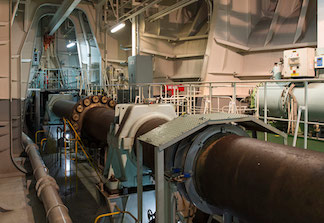The following is text of a news release from DNV GL:
(OSLO, Norway) — Classification society DNV GL will update its shaft alignment design rules to differentiate between environmentally acceptable lubricants (EALs) and mineral oils in stern tubes. The update, effective July 1, 2019, is based on the phase 1 findings from the joint development project (JDP) DNV GL has been running in cooperation with marine insurers The Swedish Club, Norwegian Hull Club, Gard and Skuld to test the potential influence of EALs on failures in stern tube bearings.
The JDP was prompted by an upsurge in stern tube bearing failures that coincided with the increased uptake of EALs after the introduction of regulations requiring their use in commercial vessels trading in U.S. waters in late 2013. In phase 1 the JDP has focused on mapping out differences in the load-carrying capacity between EALs and mineral oils. DNV GL has overseen detailed laboratory testing by Leonardo Testing Services Ltd. at the University of Sheffield, United Kingdom, and by INSAVALOR at INSA Lyon, France.
“Phase 1 has looked into how pressure, temperature and shear rate influence the viscosity of the lubricants, thereby affecting the oil film thickness and the load-carrying capacity," said Oystein Åsheim Alnes, principal engineer at DNV GL. “Test results have proven that, in particular, the pressure and temperature viscosity properties of EALs are different to those of an equal grade mineral oil. The findings show that while EALs provide safety margins that are equal to mineral oils in most operating modes, there are transient conditions where the EALs can have a reduced load-carrying capacity.”
In light of the results from the JDP, DNV GL has added a viscosity influence parameter to the existing lubrication rule criteria for the aft-most propeller shaft bearings. “The DNV GL lubrication criteria provides yards and designers with a strong tool for optimizing stern tube bearing design, including both the lubricant viscosity and now the lubricant type," said Alnes.
The JDP is now moving into the next stage, where oil film forming capabilities, mixed/boundary lubrication behavior and lubricant degradation will be further scrutinized. The JDP complements DNV GL continuing focus on shaft alignment that has also resulted in revisions to the DNV GL rules for single bearing installations as well as the introduction of the shaft align class notations in January 2018.

